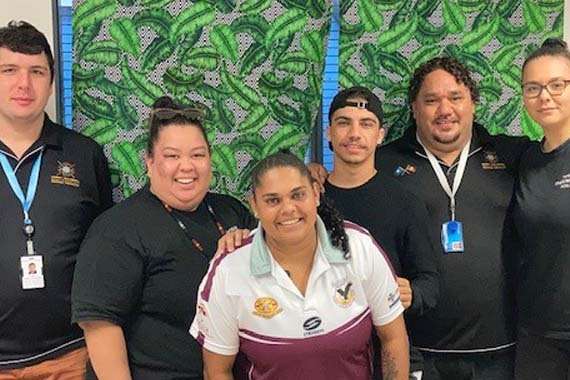Giving Aboriginal and Torres Strait Islander youth a voice in mental health care
Description
Aboriginal community-controlled health organisations have recognised the need for improved mental health and social and emotional well-being support for Indigenous youth. Prompted by this concern, a CQUniversity research team led by Professor Janya McCalman is working with Indigenous organisations and youth to co-design the improvement of current services to provide optimal care to Indigenous youth. The researchers held yarning circles with Indigenous young people and service providers to share their stories about the current state of mental health and wellbeing services and give their suggestions about how these could be improved.
Partners
Gurriny Yealamucka Health Service – Yarrabah, Bulgarr Ngaru Medical Aboriginal Service- Casino, Deadly Inspiring Youth Doing Good (DIYDG) and Queensland Government (Advance Queensland).
Impact
This research responds to policy calls for Indigenous community-driven initiatives to improve extant mental healthcare for Indigenous youth. The findings have been fed back to the community service providers and Indigenous youth to inform the co-design of novel youth-guided and community-driven ways to support mental health services for youth wellbeing.
Professor Janya McCalman, Tina McDonald and Nicole CaelliIshak
An annual Australian youth survey has shown that 43.7 per cent of Indigenous youth feel stressed all or most of the time – in fact, according to the Mission Australia survey results, their top two personal concerns are stress and mental health issues.
These declining mental health rates of Indigenous Australians have been of particular concern to Aboriginal Community Controlled Health Organisations in diverse communities, who have partnered with CQUniversity researchers to develop new responses to the high and increasing rates of Indigenous youth mental health problems.
The CQUniversity researchers have been working on conceptualising, co-design and evaluating community-driven systems-level integration with the aim to promote the mental health and well-being of Indigenous school-aged children and youth aged five to 18 years.
According to lead researcher Professor Janya McCalman, there have been 16 Australian Government policy documents between 2013 to 2018 that outline the need for improved mental health, and social and emotional well-being supports for Indigenous communities.
The Strategic Framework for Aboriginal and Torres Strait Islander mental health and social and emotional well-being outlined a vision for 'the highest attainable standard of social and emotional wellbeing and mental health supported by 'mental healthcare and related services that are effective, high quality, clinically and culturally appropriate, and affordable.
'But the problem is that there is little evidence for what best practice Indigenous mental health care looks like, or how current services and systems can be improved to provide optimal care,' she explains.
In response, Professor McCalman chose to take a place-based approach with Yarrabah, Cairns and Casino partners, where she hosted yarning circles (conversational focus groups) and consultations with 60 health, education, mental health, and other related human service providers and Indigenous youth.
'We asked Indigenous young people and service providers to share their stories about the current state of mental health and wellbeing services and give their suggestions about how these could be improved.'
Key insights from the yarning circles demonstrated that communities agree that improvements need to be community-driven and youth-guided, with service providers recognising current services and systems were not working well.
Feeling reluctant to seek help was the overall message of the youth participants, with a lack of awareness of support services, safety and relationality at the stem of this reluctance. A Casino youth said: 'I had family and friends really push me to go get the support I needed before things took a turn and got worse … It was like mostly my mum.'
The four strategies identified by youth to improve mental health and well-being support services were youth-specific information and awareness about mental health; safe and available points of contact; access to youth facilities, space and activities; and supporting the recovery of youth with mental illness.
'Overall, the focus for improvements differs, with Casino service providers identifying the need for a youth space, whereas, in Yarrabah, the focus was on supporting youth voice and governance. The feedback from service providers and youth about priority strategies will be integrated with the models and used to guide community implementation and research evaluation,' says Professor McCalman.
During the yarning circles, the research team also examined how COVID-19 has impacted Indigenous adolescent's mental health. Supported by a $150 000 Advance Queensland fellowship, the insights will be used to improve recovery and preparedness for future pandemics.
'For students in Yarrabah, the community lockdown meant that schooling was disrupted. Seventy students from 12 boarding schools returned home, but with limited internet access, available educational spaces, or IT equipment, it was difficult for schools to provide support. Re-establishing schooling routines and academic catch-up also became challenging for many students,' Professor McCalman explains.
'From the primary healthcare services' perspective, the immediate responses to the COVID threat such as preventing entry of the virus and providing a secure food supply and community education during lockdown meant they were not able to prioritise youth wellbeing.'
Professor McCalman believes that the long-term objective to support the implementation and evaluation of the agreed co-designed community models will enhance communities' preventive and early intervention mental healthcare responses in the future.
The research team will continue to work in collaboration with youth and service providers in Yarrabah, Cairns and Casino over the five-year project, with findings suggesting continued engagement between Indigenous youth and community-based service providers is vital.
Connect with CQUniversity
At CQUniversity, we know the value of our connections locally and around the world. Our partnerships help us create opportunities, deliver solutions and change lives. From time to time, we share our Connections Count update, where we share our highlights, including research impact stories like the ones below. Sign up to become one of our valued connections.

